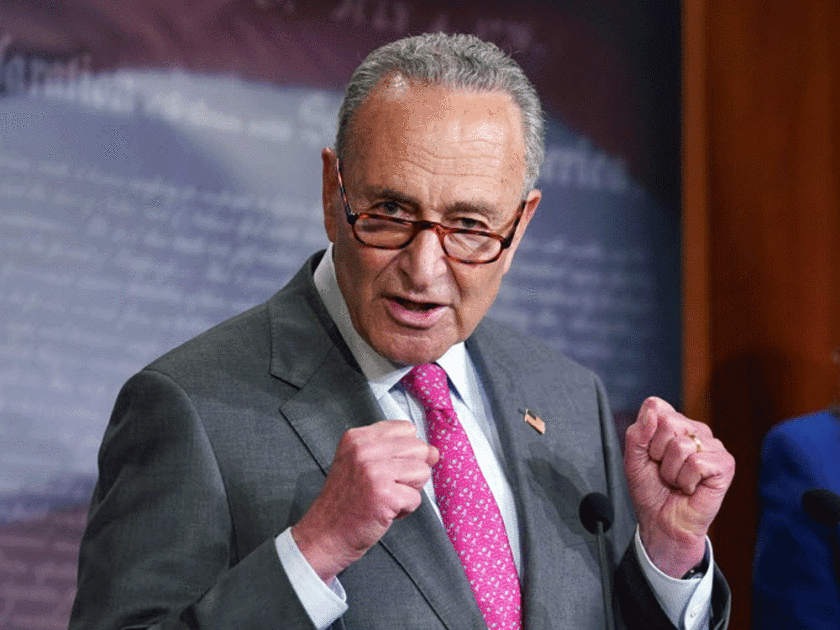
The top-ranking senator in the U.S. Democratic Party is pressuring Ottawa over protections for its dairy industry, saying the Liberal government is “evading its commitments” under a new trade agreement set to come into force next week.
Chuck Schumer, minority leader in the U.S. Senate, wrote a letter to U.S. Trade Representative Robert Lighthizer on Thursday, urging him to address Ottawa’s “lack of transparency in milk-pricing regulations” and to “ eliminate harmful dairy trade practices” by Canada.
The comments add to already heightened tensions in the U.S.-Canada trade relationship, as Lighthizer in recent weeks has claimed that Canada has ran afoul of its trade commitments on dairy and aluminum. Observers say the spat could escalate in coming days, just as the U.S.-Canada-Mexico Agreement (USMCA) comes into force July 1. A report earlier this week by Bloomberg News, citing anonymous sources, suggested the U.S. could re-impose tariffs on Canadian aluminum as early as Friday.
The letter from Schumer criticizes new dairy quota allocations set by Ottawa, which he said “weakens the intent and spirit” of USMCA in a way that will “prevent New York dairy farmers from fully benefiting from the agreement’s expanded market access opportunities.”
It comes after International Trade Minister Mary Ng tabled new allocations for so-called tariff rate quotas (TRQs) on June 15, which effectively determines which firms are allowed to import cheese, milk and butter products into Canada.
Trade allies like the U.S., New Zealand and others have long claimed that Canadian dairy TRQs fail to guarantee that foreign competitors can export their products into Canada, as a handful of domestic firms are able to control imports.
The updated TRQs allocated 85 per cent of some cheese quotas to Canadian processors, for example, which effectively hands the bulk of the market to three Canadian operators: French multinational firm Lactalis, Montreal-based Saputo, and the dairy organization Agropur Coopérative.
Darrel Pearson, head of international trade and investment at Bennett Jones, said Canada’s trading partners have for decades criticized the country’s supply managed dairy industry, which inhibits foreign competitors from accessing the Canadian market.
Canada agreed under USMCA to open up a portion of its dairy market to foreign competitors like the U.S., but Pearson said it is uncertain whether the latest TRQs break with the new trade agreement, as details of the deal have yet to be made known.
We are good at following the rules… We are also good at standing up for our national interest
“This supply management system has been in place for a long time, and unless Canada and the United States explicitly negotiated an exception to how the system was being administered, one would expect it to be administered as it always has been.”
Pearson said U.S. negotiators might have expected Canada to allocate a portion of the TRQs directly to American suppliers — an expectation that would have conflicted with many years of past experience, he said.
“I must say I’m amazed that they’re waking up to this at the eleventh hour,” he said.
In a written response to questions earlier this week, a spokesperson for Deputy Prime Minister Chrystia Freeland dismissed claims that Canada was sidestepping its trade obligations with its recent dairy allocations.
“Canada is a country that is an ardent and effective trader and trading partner,” spokesperson Katherine Cuplinskas said. “We are good at following the rules and we believe in doing so. We are also good at standing up for our national interest and that is something we will continue to do.”
I’m amazed that they’re waking up to this at the eleventh hour
Marc Gold, the Liberal government’s representative in the Senate, said in a debate on Thursday that Ottawa was “very aware of the possibility” of re-imposed tariffs on aluminum or other products. He said tariffs “will not be met with silence by this government.”
Also in the Schumer letter, Jaime Castaneda, a vice-president at the National Milk Producers Federation, said the USMCA agreement ought to have provided better access to the Canadian market for U.S. companies — a stipulation that he says now appears unlikely.
“Canada’s efforts to manipulate its agreed upon trade obligations to protect its tightly controlled dairy market are unacceptable,” he said.
The first protections for the dairy industry were introduced in Canada around 1970, which limit production volumes to keep prices artificially high. Additional protections for chicken, eggs, turkey and other products were phased in over the following decade. Today, dairy markets are controlled through production quotas, fixed pricing and heavy tariffs on imports ranging between 246 and 300 per cent.

























